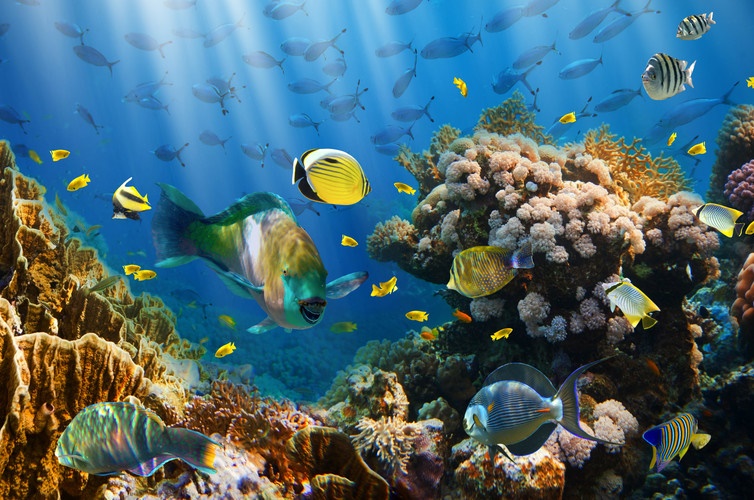
The United Nations Ocean Conference marks the first time that oceans have been put at the forefront of global affairs. It straddles the United Nations Oceans Day on 8 June, giving countries and their non-government partners a stage to present their perspectives on achieving the Sustainable Development Goals. The focus will be on Goal 14 – oceans, seas and marine resources for sustainable development.
This is a big moment. For the first time, under the banner of the “Blue Economy”, the global community is viewing the ocean not as a limitless resource for making money, but as a finite and vulnerable asset; one that needs careful management and stewardship to ensure it can continue to deliver wealth and benefits in the long term, not just short term profit.
It has been an uphill struggle to get businesses and economists to recognise that ecosystems can’t provide without limit. The time where fishermen or businesses could just move to a new untapped location is over. The ocean is nearing the limits of what it can provide without going into decline. There’s nowhere else to go for new biological resources. We must nurture what we have.
The Ocean Conference provides East African countries, as well as the world, a golden opportunity to present their aspirations for growing their “blue” or ocean economies sustainably. This is an opportunity on a world stage to align government, economic thinking and biology. It’s a chance to look at the oceans in the context of all society rather than in isolation.
The shared language and concepts open up avenues for trust that enable decisions and real actions that deliver benefits to businesses, people and the environment.
Africa’s golden goose
Small island states have always focused on the sea as a precious asset that needs care and attention. Only now are mainland East African countries beginning to look beyond land for the “golden goose” to fuel the coming decades as they move to become middle-income economies.
A recent report led by the World Wildlife Fund estimated that the economy of East Africa’s seas would line up in fourth place if it were one of the countries. This is evidence of the opportunities available from our seas.
The region’s greatest ocean wealth is currently generated through tourism (60%) and there’s great growth potential in this, fisheries, biotechnology and other sectors.
Across the board, the region’s maritime economic sectors are only at the first stages of development. For example, Kenya’s marine fisheries have consistently recorded national marine catches less than 5% of the total estimated resource. Fisheries and other sectors can likely grow and multiply many times, and be a real engine for development for all coastal countries.
But, as expressed by the Economist, this can only happen sustainably if limits to growth and extraction are recognised and economic growth is planned to ensure no impact on the biological processes that “lay the golden egg”.
High-level opportunity
There are a number of ways in which countries can plan, collectively, to protect the oceans.
For example, it’s in the best business interest that fish should only be caught at a maximum rate that a stock of fish can provide such that it doesn’t decline. Just as trust funds spend their interest, but not their capital. And protected areas can serve to secure the capital asset, fish stocks, for them or their young to be caught outside the boundaries – that is, in the open market. Banks protect financial capital, protected areas protect natural capital.
Another example is the complex benefits from different types of fishing not captured by economics-only approaches. Commercial fisheries deliver cash returns to investors, based on high capital investments in boats and gear, but have relatively low employment levels. Small scale fisheries, on the other hand, deliver much less cash return. Instead they provide a complex mix of economic (cash) and social (nutrition, communal) benefits to large numbers of fishers. Both are key to national economies, serving different roles among countries and cultures.
Also, just as markets are thought to express rational behaviour by consumers, and more data strengthens this, so does better data promote rational decisions on ocean resources. Improved monitoring of assets through better surveillance of, for example fishing activity, as well as of illegal activities, is essential to protect common interests and ensure rational behaviour around ocean assets. However oceans are a long way from the up-to-the-minute reporting expected for financial markets, or weather services. Distortions in ocean use driven by vested interests, historical policies now known to be unsound, and excess capacity, all need to be eliminated to better protect ocean assets.
![]() The Ocean Conference provides a first platform for countries to rally not just around ocean issues, but also to frame them in the broader dialogue around sustainable development and improving the lives of citizens - those that live and depend directly on the sea, and those that may live far inland, but benefit from the goods and services provided by the ocean.
The Ocean Conference provides a first platform for countries to rally not just around ocean issues, but also to frame them in the broader dialogue around sustainable development and improving the lives of citizens - those that live and depend directly on the sea, and those that may live far inland, but benefit from the goods and services provided by the ocean.
David Obura, Adjunct Fellow, The University of Queensland
This article was originally published on The Conversation. Read the original article.




 Publications
Publications
 Partners
Partners









